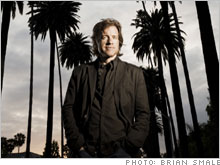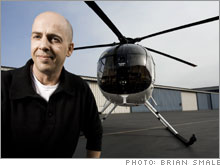Money men
Hollywood's business model may be crumbling. So why is a new wave of wealthy outsiders putting up millions to make movies?
NEW YORK (FORTUNE) - Like most movies directed by legendary filmmaker Robert Altman, "A Prairie Home Companion" is packed with stars. Tommy Lee Jones, Kevin Kline, and Woody Harrelson all have roles in the film based on Garrison Keillor's beloved radio show; Lily Tomlin and Meryl Streep play a musical sister act, and starlet Lindsay Lohan - hot off "Herbie Fully Loaded" - shows up, improbably, as Streep's poetry-penning daughter. At a private premiere of the movie in St. Paul in early May, the subdued Midwestern city was transformed into Tinseltown, complete with red carpets, paparazzi, and fans straining for a glimpse of bona fide celebrities.
And then there was multi-millionaire Bill Pohlad. He is not close to being a household name (except in his hometown, where his father, Carl, owns the Minnesota Twins). Still, by some important measures, he's a rising star in Hollywood. He not only personally helped finance Altman but also backed "Brokeback Mountain." But what's really interesting about Pohlad's show business venture is what it means for the movie industry. He and other deep-pocketed moneymen are part of a new wave of outsiders rushing to finance movies that are to some extent changing the way films are produced. Go west, young millionaires
Ever since Joe Kennedy moved west in 1926, wealthy outsiders have been drawn to Hollywood for its glitz and glamour - and the chance to make even more money. Today a cadre of investors is putting up millions to make movies ranging from small-budget fare such as "Thank You for Smoking" to "event movies" like "The Chronicles of Narnia" series. Web entrepreneur and flamboyant Dallas Mavericks owner Mark Cuban has a fledgling film empire, as does eBay's founding president, Jeff Skoll. Billionaire Philip Anschutz is financing family-friendly, big budget confections, and Chicago Bulls co-owner James Stern is in the movie game. And now Wall Street is cooking up elaborate co-financing schemes to enable hedge funds and other institutions to invest in films, with more deals to come. It's hard to pin down how much dough these guys have poured into films. And it's harder to know who is turning a profit. But there's so much new money in Hollywood that talent agencies have started playing matchmaker, hooking up their creative clients with wealthy patrons. "I know for a fact that there's more capital available, and there's an openness on the part of talent to work outside the studio system," says Rick Hess, head of the film finance group at Creative Artists Agency. Some big studio execs look on in amusement at the newcomers, especially those with art-house pretensions. "I don't mean to look down my nose at people who think they are making culture and not entertainment," says Bob Shaye, co-chairman of New Line Cinema, the maker of the Lord of the Rings trilogy (and, like CNNMoney.com and FORTUNE, part of Time Warner (Research)). "But usually those people lose a couple of million dollars and realize they want to get back to real estate or whatever they did before." Still, for the most part, the studios are cheery about the new infusion of cash because someone else is footing the bill for moviemaking. Besides, they're focused on making event movies that can yield big returns and profitable merchandising deals (Spider-Man underwear - that kind of thing). The rise of independently financed films has allowed the majors to fill their pipelines with low- to mid-budget flicks without risking much upfront capital. And now Hollywood has figured out another way to share expenses: Partner with a new kind of finance company that pools money from pensions, private equity firms, and hedge funds that are flush with cash. The business side
Can the new guys really make money? No matter who pays, the studios take their cut first. Once an independently financed movie is completed, the filmmakers can sell it outright to a studio - the kinds of deals that usually come out of festivals like Sundance - or they can get a studio to distribute the film. That doesn't come cheap: The studios may spend millions on marketing, and they also charge distribution fees of 10 percent to 20 percent of the film's revenue, which the studio gets before the moneyman sees a dime. Even when the studios have some skin in the game - when they co-finance movies, for example - they still take a round of fees before splitting the profits. "We think this is the sweet spot of co-financing," says Rick Finkelstein, president of Universal Pictures, which has a co-financing arrangement with a company called Relativity Media. (Relativity also has a deal with Sony.) "It allows us to reduce our risk, reduce our cash, and, as worldwide distributors, we're allowed to be paid off the top. We haven't had to give up much." And yet institutional investors are happy to sign up for this deal: Credit Suisse (Research) last year put together Kingdom Films to invest in Disney live-action movies; J.P. Morgan (Research), which lends to much of the film industry, is working on a venture called Hemisphere Film Partners that aims to help finance big budget movies, those in the $100-million-plus range. All told, we're talking billions in movie financing. Despite the studios' advantage, these outsiders figure they can profit. J.P. Morgan calculated the cash-on-cash return for movies and found yields to be highest - 32 percent - for films that cost more than $100 million to make. The cash-on-cash return for movies with budgets between $50 million and $75 million was in passbook-savings account range, at 5 percent. Movies with budgets of $75 million to $100 million returned a measly 2 percent. But the real money may lie in film libraries - new international markets are opening up and movies will be distributed over the Internet and via devices like cell phones. Bidding for movie libraries has been ferocious; earlier this year a group including George Soros bought the DreamWorks library in a deal that valued the 59-film portfolio at $900 million. Outsiders have always come to Hollywood, of course, but today's new money is much more involved in every aspect of the filmmaking process, and many of the financiers insist they are in the business for love of film, not money. The do-it-yourselfer
David Sacks, who financed "Thank You for Smoking," is one template for the new wave of financiers: the do-it-yourselfer. Sacks, 33, arrived in Hollywood three years ago, after eBay (Research) spent $1.5 billion to acquire PayPal, the Internet payment company he helped launch. He immediately found the script for "Smoking" and spent 18 months securing the rights to make the movie, a political satire based on a Christopher Buckley novel. "He really believed in this movie and pursued it with the same gumption that he applied to PayPal," says Jason Reitman, the film's screenwriter and director. Sacks attacked the project with the intensity of the Internet entrepreneur that he is, negotiating with the unions, working on post-production - he even helped with casting. Sacks had reason to pay attention to detail: He and some of his PayPal friends put up most of the money, about $4.2 million; he borrowed another $3.3 million for a total budget of $7.5 million. Fox Searchlight acquired the film for nearly $7 million, and thanks to $2 million in advance sales to foreign distributors, Sacks says he's already in the black. And he's now the toast of the town. Variety recently named him one of ten producers to watch, and he has gone Hollywood in at least one big way: He lives in the house where Quentin Tarantino filmed parts of "Pulp Fiction." The calculator
Thomas J. Tull is a little more old school but more innovative - and influential - when it comes to deals. He represents hundreds of millions of dollars from conservative investors like pension funds, all of which are trusting him to invest that money alongside Warner Bros. He's the brains behind Legendary Pictures, a concept he dreamed up while working as CEO of Convex Media of Atlanta. About two years ago, on nights and weekends, the 35-year-old Tull would pore over box-office totals and investment simulations, trying to figure out the seemingly impossible: a way for investors to make consistent, reliable returns in the inconsistent movie business. His idea (and the gimmick of a lot of other guys pooling capital) was to do what the studios do: invest in lots of studio-financed movies. The result: a new kind of financing company that has raised $600 million, from institutions such as AIG Direct Investments, Banc of America Capital Investors, and even the Honeywell pension fund, which Legendary will then plow into pictures. Its current arrangement with Warner Bros.: Legendary will split costs with the studio, roughly fifty-fifty, on 25 films (including big movies such as "Superman Returns") over five years. It will also split the profits on those films - if there are any - after Warner takes its distribution fee. The art-house studio system
Bob Yari, like Tull, thinks big. But he has a different strategy: Bring the studio system to the art-house movie. For Yari, who made his fortune investing in malls and office buildings, that means churning out films of disparate genres and varying quality. He backed the Oscar-winning "Crash," which cost $6.5 million and has taken in about $93 million worldwide so far. But he's also responsible for "A Love Song for Bobby Long," which has grossed less than $1 million. Yari, 44, says his frenzied output is all part of the business plan. "Making one or two films is very risky, but with ten or 12 films, the returns are much more predictable," he says. "That's how the studios do it - it's a numbers game." He isn't just the most prolific of the new money guys, he's arguably the most controversial. He sued the Oscar people for denying him an official producer credit on "Crash." (The Academy is trying to limit the number of producers who are eligible.) And Hollywood skeptics whisper that he is spread too thin - Yari's film companies have backed 25 films in three years. That's malarkey, says Yari, who has launched his own distribution unit. (He's also in the process of trying to buy the rights to a script called "Run Through the Jungle," a film about a child's adventures on a safari. The script was bought two decades ago, but the movie never got made. One of the screenwriters? An aspiring 24-year-old filmmaker named Bob Yari.) For love of the movies
Bill Pohlad is a different breed. He doesn't aspire to build a huge portfolio of movies or scour Wall Street for cash. He's the pure art-house guy. "For me, this is about love of movies, not a business deal or because there's a big opportunity to make money," says Pohlad. Indeed, while guys like Yari talk about studio models, Pohlad, 50, seems most at home talking about the kinds of movies he wants to make. The fact that movies like "Brokeback Mountain," which has grossed some $175 million worldwide, happen to be successful seems like a happy coincidence. "I'm proud of the fact that our slate consists almost 100 percent of movies I love and have a strong creative connection to," Pohlad says. That makes him a dream financier for auteurs such as "A Prairie Home Companion" director Altman. "Bill has a truly aesthetic approach," says CAA's Hess, who introduced Pohlad to Universal's Focus Features indie unit, which asked him to cofinance the risky "Brokeback Mountain." Before he became a financier in earnest, Pohlad's small film-production company made documentaries and inflight programming for Northwest Airlines. Says Hess: "I call him a modern-day de Medici." It will be a while before we know whether Pohlad, Yari, and others have ultimately changed the way movies are produced. Will they become fixtures in Hollywood? Or, as New Line's Shaye says, will they go back to "whatever they did before" once they hit a losing streak?
Even the most jaded Tinseltown types have to admit that the new moneymen have made a mark. And as long as they create hits - and make the film business less risky for the majors - those kids, to paraphrase studio executive Robert Evans, will get to stay in the picture. |
| |||||||||||||||||||||||||||||||||||||||||||||||||||||||||||||||||||||||||||||||||||||||||||||||||||||



